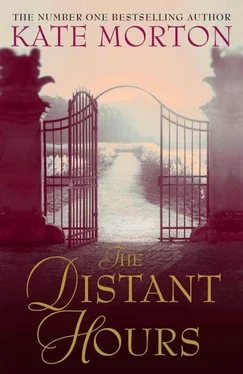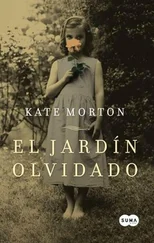Sounding a disconsolate huff, then doing the same again because the sensation so pleased her, Saffy started back towards the house, glad as always that her path didn’t take her through the main gardens. She couldn’t bear it; they’d been glorious once. It was a tragedy that so many of the nation’s flower gardens had been abandoned or given over to vegetable cultivation. According to Juniper’s most recent letter, not only had the flowers by Rotten Row in Hyde Park been flattened beneath great piles of wood and iron and brick – the bones of Lord only knew how many homes – the entire southern side was given over now to allotments. A necessity, Saffy acknowledged, but no less tragic for it. Lack of potatoes left a person’s stomach growling, but absence of beauty hardened the soul.
Directly before her a late butterfly hovered, wings drawing in and out like the mirrored edges of a set of fireside bellows. That such perfection, such natural calm, should continue while mankind was bringing the world’s ceiling down around it – why, it was nothing short of miraculous. Saffy’s face lightened; she held out a finger but the butterfly ignored her, lifting then falling, darting to inspect the brown fruits of the medlar tree. Completely oblivious – what wonder! With a smile, she continued her trudge towards the castle, ducking beneath the knobbled wisteria arbour, careful not to catch her hair.
Mr Churchill would do well to remember that wars were not won by bullets alone, and to reward those who managed to sustain beauty when the world was being blasted into ugly pieces around them. The Churchill Medal for the Maintenance of Beauty in England had a lovely ring to it, Saffy thought. Percy had smirked when she’d said so at breakfast the other morning, with the inevitable smugness of one who’d spent months climbing in and out of bomb craters, earning her very own bravery medal in the process, but Saffy had refused to feel foolish. Indeed, she was working on a letter to The Times on the subject. The thrust of it: that beauty was important, as were art and literature and music; never more so than when civilized nations seemed intent upon goading one another into increasingly barbarous acts.
Saffy adored London, she always had. Her future plans depended upon its survival and she took each bomb dropped as a personal attack. When the raids had been in full swing and the crump of distant anti-aircraft guns, the screaming sirens, the miserable explosions had been nightly companions, she’d chewed her nails feverishly – a terrible habit and one whose blame she laid squarely at Hitler’s feet – wondering whether the lover of a city might suffer its plight all the more for being absent when disaster struck, in the same way a mother’s anxiety for a wounded son was magnified by distance. Even as a girl Saffy had glimpsed that her life’s path lay not in the miry fields or within the ancient stones of Milderhurst, but amidst the parks and cafes, the literate conversations of London. When she and Percy were small, after Mother was burned but before Juniper was born, when it was still just the three of them, Daddy had taken the twins up to London each year to live for a time at the house in Chelsea. They were young; time hadn’t yet rubbed away at them, polishing their differences and sharpening their opinions, and they were treated – indeed they behaved between themselves – as a pair of duplicates. Yet when they were in London, Saffy had felt the early stirrings of division, deep but strong, within herself. Where Percy, like Daddy, pined for the vast, green woods of home, Saffy was enlivened by the city.
An earthy rumble sounded behind her and Saffy groaned, refusing to turn and acknowledge the heavy clouds she knew were gloating over her shoulder. Of all the war’s personal privations, the loss of a regular wireless weather forecast had been a particularly cruel blow. Saffy had faced the shrinkage of quiet reading time with equanimity, agreeing that Percy should bring her one book a week from the lending library instead of the usual four. On the matter of retiring her silk dresses in favour of practical pinafores she’d been positively sanguine. The loss of staff, like so many fleas from a drowning rat, and the consequent adjustment to her new status as head cook, cleaner, laundress and gardener, she’d taken in her stride. But in Saffy’s attempts to master the vagaries of the English weather she had met her match. Despite a lifetime in Kent, she had none of the countrywoman’s instincts for weather: she had discovered, in fact, a curious antithetical knack for hanging out washing and braving the fields on the very days rain was whispering in the wings.
Saffy marched faster, almost at a canter, trying not to mind the odour of the onion leaves, which seemed to be gaining strength as she gained pace. One thing was certain: when the war ended, Saffy was giving up country life for good. Percy didn’t know it yet – the timing must be right before the news was broached – but Saffy was going up to London. There she intended to find herself a flatlet, just for one. She had no furniture of her own, but that was a small impediment: such matters Saffy entrusted to providence. One thing was certain, though, she’d be taking nothing with her from Milderhurst. Her accoutrements would all be new; it would be a fresh start, nearly two decades later than she’d initially planned, but that could not be helped. She was older now, stronger, and this time she wouldn’t be stopped no matter how overwhelming the opposition.
Though her intentions were secret, Saffy made a habit of reading the letting pages in The Times each Saturday so that when opportunity presented, she’d be ready. She’d considered Chelsea and Kensington but decided in favour of one of the Georgian squares in Bloomsbury, in walking distance of both the British Museum and the shops of Oxford Street. Juniper, she hoped, might also remain in London and set up in a place nearby, and Percy would, of course, come to visit. She’d stay no longer than a single night though, due to strong feelings about sleeping in her own bed and being on hand to prop up the castle, bodily if need be, should it begin to crumble.
In the privacy of her own thoughts, Saffy visited her little flatlet often, especially when Percy was stalking up and down the castle corridors, raging about the flaking paint, the sinking beams, decrying each new crack in the walls. Saffy would close her eyes and open the door to her very own home. It would be small and simple, and very clean – she’d take care of that herself – and the overriding smell would be one of beeswax polish. Saffy clenched her fist around the onion sprigs and walked even faster.
A desk beneath the window, her Olivetti typewriter at its centre and a miniature glass vase – an old but pretty bottle would do at a pinch – in the corner, with a single flower in the prime of its bloom, to be replaced daily. The wireless would be her only companion, and throughout the day she’d pause in her typing to listen to the weather reports, leaving briefly the world she was creating on the page to gaze through the window at the smokeless London sky. Sunlight would brush her arm, spilling into her tiny home and setting the beeswax on the furniture to sparkling. In the evenings, she’d read her library books, write a little more of her own work in progress, and listen to Gracie Fields on the wireless, and no one would grumble from the other armchair that it was a load of sentimental rubbish.
Saffy stopped, pressed her palms to her warm cheeks and gave a sigh of deep contentment. Dreams of London, of the future, had brought her all the way back to the rear of the castle: what was more, she’d beaten the rain.
A glance at the henhouse, and her pleasure was curdled somewhat by regret. How she’d live without her girls she didn’t know; she wondered if it would be possible to take them with her. Surely there’d be space in her building’s little garden for a small run – she would just have to add this necessity to her list.
Читать дальше












